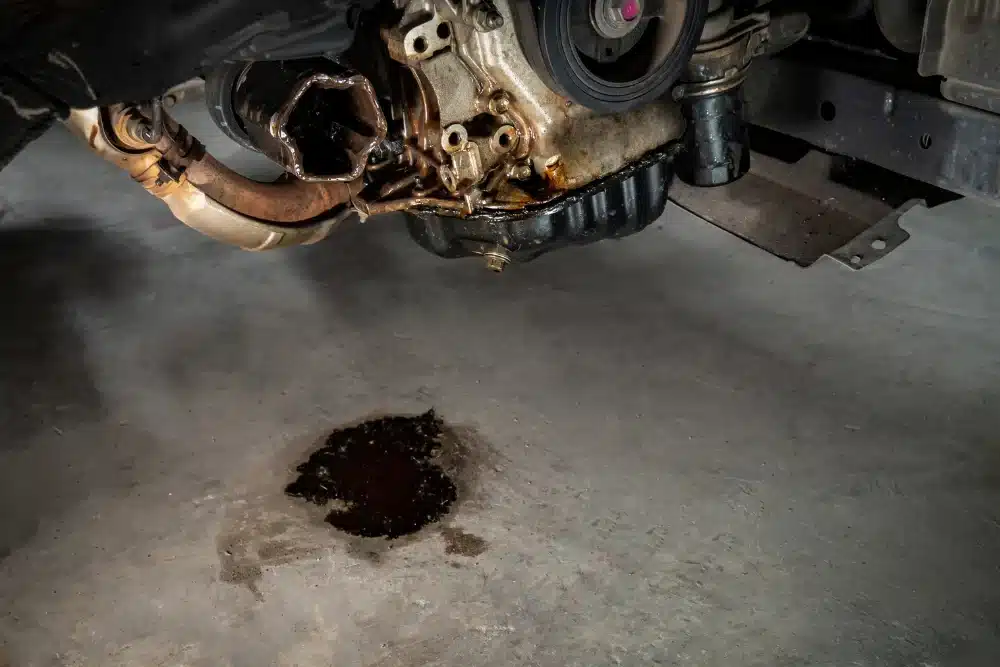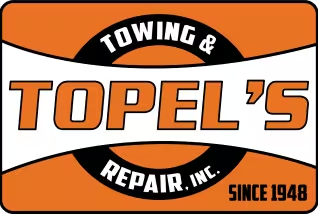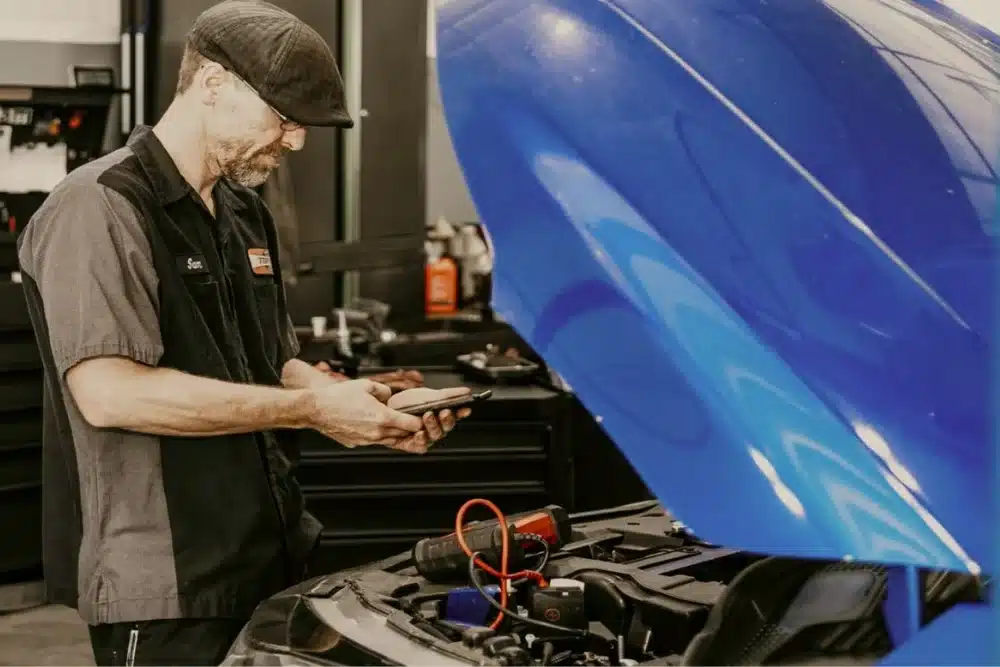Professional Oil Leak Detection: Preventing Costly Engine Damage
- September 8, 2025

TL;DR: Oil leaks aren’t just messy—they’re a warning sign that your engine could be at risk. Left unchecked, they can cause overheating, loss of lubrication, and even total engine failure. Quick action and a proper repair can save you from breakdowns and expensive fixes down the road.
That small puddle of oil under your car might seem harmless, but it could be your engine’s way of warning you about bigger problems ahead. Engine oil leaks often start small and gradually worsen, potentially leading to costly engine damage if left unaddressed. At Topel’s Towing and Repair in Lake Mills, WI, our experienced technicians use advanced vehicle testing methods to identify the root cause of oil leaks before they become major engine issues, helping you maintain a safe and reliable vehicle while protecting your investment.
Understanding what causes oil leaks and recognizing the warning signs can save you thousands in engine repair costs down the road. Let’s explore why that seemingly minor leak deserves your immediate attention and how professional engine service can keep your vehicle running smoothly for years to come.
Common Causes of Engine Oil Leaks
Engine oil leaks can develop from several different sources, each requiring specific testing approaches to properly identify and address. Understanding these common causes helps you recognize when professional vehicle testing becomes essential for preventing more serious engine problems.
Worn Engine Gaskets and Seals
Over time, rubber gaskets and seals throughout your engine naturally deteriorate due to heat, pressure, and age. The valve cover gasket, oil pan gasket, and rear main seal are particularly prone to failure in vehicles with higher mileage. These components expand and contract repeatedly as your engine heats up and cools down, eventually causing them to crack or lose their sealing ability.
When gaskets fail, several problems can occur:
- Oil leaks onto hot engine components, creating burning odors
- Potential fire hazards from oil on hot surfaces
- Risk of leak worsening and affecting other engine components
- Need for professional testing to pinpoint exact gasket locations
Damaged Oil Pan
Your oil pan sits at the bottom of your engine and holds the majority of your engine’s oil supply. Road debris, speed bumps, or parking lot obstacles can damage the oil pan, creating cracks or loosening the drain plug. Even small impacts can cause hairline cracks that gradually worsen over time.
A damaged oil pan not only leaks oil but can also lose oil pressure, which poses immediate risks to your engine’s internal components. Our technicians use specialized equipment to inspect oil pan integrity and determine whether repair or replacement provides the best long-term solution.
Faulty Oil Filter or Drain Plug
Sometimes oil leaks originate from components that seem simple but play crucial roles in your engine’s health. A loose drain plug, a worn drain plug gasket, or an improperly installed oil filter can create persistent leaks that worsen with each drive cycle.
These issues often develop after oil changes when components aren’t properly tightened or when old gaskets aren’t replaced. Professional engine service ensures proper installation and uses quality components that maintain their seal over time.
Warning Signs Your Oil Leak Needs Immediate Attention
Not all oil leaks present the same level of urgency, but certain warning signs indicate your vehicle needs immediate professional evaluation. Recognizing these symptoms can prevent minor leaks from becoming major engine failures that require extensive repair work.
Watch for these critical warning signs that demand immediate attention:
Oil Puddles Growing Larger
If the oil spots under your vehicle are increasing in size or frequency, your leak is worsening and won’t resolve itself. What starts as a few drops can quickly become a steady drip that depletes your oil levels faster than you might realize.
Large oil puddles indicate significant seal failure or component damage that requires immediate attention. Continuing to drive with major oil leaks can lead to oil starvation and catastrophic engine damage.
Low Oil Pressure Warning Light
When your oil pressure warning light illuminates, your engine isn’t receiving adequate lubrication to protect its moving parts. This situation can cause bearing damage, seized pistons, or complete engine failure within minutes of continued operation.
Oil leaks can contribute to low oil pressure by reducing the total amount of oil available for circulation. If you notice both oil leaks and pressure warnings, stop driving immediately and seek professional engine service to prevent irreversible damage.
Blue Smoke from Exhaust
Blue or gray smoke coming from your exhaust pipe often indicates oil burning inside your engine cylinders. This can result from oil leaks that allow oil to seep past worn valve guides, piston rings, or other internal components.
Burning oil not only wastes your engine oil but also indicates wear patterns that will worsen without proper attention. Professional vehicle testing can determine whether internal engine components need replacement or if external leak repairs will resolve the issue.
The Hidden Costs of Ignoring Oil Leaks
Many vehicle owners postpone oil leak repairs because they seem minor compared to other automotive issues. However, ignoring these leaks often leads to far more expensive problems that could have been prevented with timely intervention and proper engine service.
Progressive Engine Damage
Oil provides critical lubrication for dozens of moving parts inside your engine. When oil levels drop due to leaks, critical engine components suffer:
- Increased friction and heat on moving parts
- Accelerated wear on bearings, camshafts, and pistons
- Risk of permanent damage from insufficient lubrication
- Potential for complete engine failure requiring costly rebuilds
The cost difference between replacing a gasket and rebuilding an entire engine can be thousands of dollars. Early detection through professional vehicle testing allows you to address problems before they cascade into major engine failures.
Environmental and Safety Concerns
Oil leaks create several serious hazards:
- Environmental contamination of groundwater and storm drains
- Slip hazards on garage floors and driveways
- Fire risks when oil contacts hot exhaust components
- Harmful fumes that can enter your vehicle’s cabin
Professional engine repair eliminates these safety concerns while protecting your family and the environment.
Ready to address that oil leak before it becomes a major problem? Our experienced team at Topel’s Towing and Repair uses cutting-edge vehicle testing equipment to identify the exact source of your oil leak and provide long-lasting solutions.
Visit us at 1110 S Main St, Lake Mills, WI 53551, or call 920-648-8115 to schedule your comprehensive engine evaluation today.
Professional Vehicle Testing vs. DIY Diagnosis
Modern engines contain complex systems that require specialized equipment and expertise to properly evaluate. While you might be tempted to diagnose oil leaks yourself, professional vehicle testing provides accuracy and thoroughness that prevent misdiagnosis and unnecessary repairs.
Advanced Testing Equipment
Our technicians use advanced tools to pinpoint leak sources with precision. These instruments can detect internal engine problems that aren’t visible during basic visual inspections, ensuring we address the root cause rather than just the symptoms.
Professional testing equipment can also identify potential problems before they cause leaks, allowing for preventive maintenance that saves money and prevents unexpected breakdowns. This level of analysis simply isn’t possible with basic DIY methods.
Systematic Leak Detection Process
Our proven diagnostic approach ensures we find the exact source of your leak:
- Thorough cleaning of the engine area to remove old oil residue
- Introduction of UV dye into your oil system
- Short test drive to circulate the dye throughout the engine
- UV light inspection to pinpoint the exact leak location
This systematic approach eliminates guesswork and ensures we repair the actual problem rather than just the most obvious symptoms.
Comprehensive System Evaluation
Engine oil leaks often indicate broader issues with engine health, cooling system performance, or maintenance schedules. Professional vehicle testing evaluates all related systems to ensure we identify any contributing factors that could cause future problems.
Our comprehensive approach means you get complete solutions rather than temporary fixes. We examine oil pressure, cooling system integrity, and engine timing to ensure your repair addresses all potential causes of oil leaks.
Why Choose Professional Engine Repair Services
When oil leaks require repair, the quality of workmanship and parts directly affects how long your solution will last. Professional engine service provides warranties, quality components, and expertise that ensure your repair investment provides long-term value.
Quality Parts and Materials
Professional shops use superior components that provide:
- OEM or equivalent quality gaskets and seals
- Parts designed for your vehicle’s specific pressures and temperatures
- Better longevity compared to cheap aftermarket alternatives
- Reduced need for repeated repairs
These parts are designed to withstand the specific pressures, temperatures, and chemical exposures your engine creates. Quality components backed by professional installation provide better long-term value and reliability.
Comprehensive Warranties
Reputable engine repair services stand behind their work with substantial warranties that protect your investment. At Topel’s Towing and Repair, we offer a 3-year/36,000-mile nationwide warranty that gives you confidence in our repairs and demonstrates our commitment to quality workmanship.
Professional warranties also include parts and labor, ensuring you’re protected if any issues arise after your repair. This level of protection isn’t available with DIY repairs or discount service providers.
Preventive Maintenance for Oil Leak Prevention
The best approach to oil leak problems involves preventing them through proper maintenance and regular vehicle testing. Understanding how maintenance schedules and driving habits affect seal longevity helps you avoid unexpected leaks and expensive repairs.
Regular Oil Change Intervals
Fresh oil contains additives that help maintain seal flexibility and prevent degradation. Old oil becomes acidic and can accelerate gasket deterioration, making leaks more likely to develop.
Following manufacturer-recommended oil change intervals with quality oil helps your seals and gaskets maintain their integrity longer. Our technicians can recommend oil types and change intervals based on your driving patterns and vehicle usage.
Cooling System Maintenance
Excessive engine heat accelerates seal deterioration and can cause gaskets to fail prematurely. Proper cooling system maintenance ensures your engine operates at optimal temperatures, extending the life of seals and gaskets throughout the engine.
Regular coolant changes and thermostat inspections prevent overheating conditions that contribute to oil leak development. Professional maintenance schedules address these interconnected systems to prevent problems before they start.
Don’t wait for your oil leak to become a major engine problem. Contact Topel’s Towing and Repair today for expert diagnosis and professional repair solutions that protect your investment.
Call us at 920-648-8115 or visit our facility at 1110 S Main St, Lake Mills, WI 53551 to schedule your vehicle evaluation.
FAQs
How much oil can I safely lose before engine damage occurs?
Any amount of oil loss should be addressed promptly, as even small leaks can worsen quickly and lead to low oil levels. Most engines can safely operate with oil levels between the minimum and maximum marks on the dipstick, but consistently low levels due to leaks can cause bearing damage and other serious problems. Check your oil level weekly and add oil as needed while scheduling professional vehicle testing to identify and repair the leak source.
Can I use stop-leak additives to fix my oil leak?
Stop-leak additives may temporarily slow minor leaks by causing seals to swell, but they don’t address the underlying problem and can sometimes cause new issues with other engine components. These products work best on very small leaks from aging seals, but they’re not effective for damaged gaskets, cracked oil pans, or loose connections. Professional engine repair provides permanent solutions that address the actual cause of your leak.
How long can I drive with a small oil leak?
The safety of driving with an oil leak depends on the leak rate and your ability to maintain proper oil levels. Small leaks that only create a few drops might be manageable for short periods if you check oil levels frequently and add oil as needed. However, any leak can worsen suddenly, and driving with low oil levels risks catastrophic engine damage. Schedule professional testing as soon as possible to prevent the leak from becoming a major problem.
Why do oil leaks seem to get worse in winter?
Cold temperatures cause rubber seals and gaskets to contract and become less flexible, which can worsen existing leaks or create new ones. Additionally, the thick oil used in winter takes longer to circulate during startup, potentially creating higher pressures that stress aging seals. Regular maintenance and using the correct oil viscosity for your climate helps minimize temperature-related leak issues.
Key Takeaways:
Don’t ignore oil leaks. Catching them early protects your engine, saves money, and keeps your vehicle running reliably. Topel’s Towing and Repair in Lake Mills, WI, offers thorough leak detection and lasting repairs backed by a 3-year/36,000-mile warranty.
Expert Oil Leak Repair Services in Lake Mills, WI
Don’t let that oil leak in your driveway turn into expensive engine damage. Professional vehicle testing and timely engine repair can save you thousands while keeping your vehicle safe and reliable.
At Topel’s Towing and Repair, we combine decades of experience with cutting-edge technology to provide comprehensive engine service that addresses problems before they become major failures. Visit us at 1110 S Main St, Lake Mills, WI 53551, or call 920-648-8115 to schedule your engine evaluation today.
Experience the difference that professional expertise and quality workmanship make for your vehicle’s long-term health.
Recent Blogs



